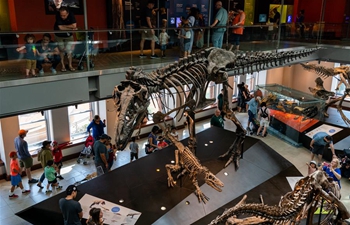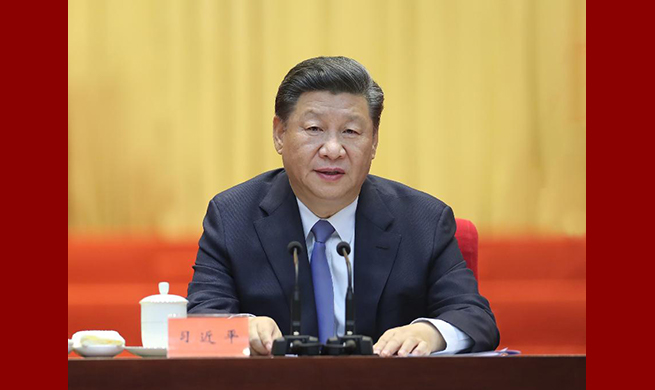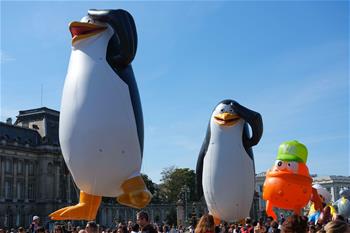UNITED NATIONS, Sept. 22 (Xinhua) -- The United Nations on Sunday published a landmark report, one day before the UN Climate Action Summit.
The report -- United in Science -- completed in a joint-effort including the World Meteorological Organization (WMO), underlines the "glaring and growing" gap between agreed targets to tackle global warming and the reality.
REPORT AT A GLANCE
The report includes details on the state of the climate and presents trends in the emissions and atmospheric concentrations of the main greenhouse gases.
It highlights the urgency of fundamental socio-economic transformation in key sectors -- such as land use and energy -- in order to avert dangerous global temperature increase with potentially irreversible impacts.
It also examines tools to support both mitigation and adaptation.
"The report provides a unified assessment of the state of our earth system under the increasing influence of anthropogenic climate change, of humanity's response thus far and of the far-reaching changes that science projects for our global climate in the future," said a science advisory group to the UN Climate Action Summit.
The report highlights the worst effects of climate change and represents the very latest authoritative information on these topics, said the group, which comprises highly recognized and respected natural and social scientists.
MORE HEAT, MORE EMISSIONS
According to the WMO, the average global temperature for 2015-2019 is on track to be the warmest of any equivalent period on record. It is currently estimated to be 1.1 degrees Celsius above pre-industrial (1850-1900) times.
Arctic summer sea-ice extent has declined at a rate of approximately 12 percent per decade during 1979-2018. The amount of ice lost annually from the Antarctic ice sheet increased at least six-fold between 1979 and 2017. Glacier mass loss for 2015-2019 is the highest for any five-year period on record.
According to the report, levels of the main long-lived greenhouse gases, carbon dioxide, methane and nitrous oxide have reached new highs.
There is still no sign of a peak in global emissions, even though they are growing slower than the global economy, the report said.
The emissions, it said, are not estimated to peak by 2030, let alone by 2020, if current climate policies and ambition levels of the Nationally Determined Contributions (NDCs) are maintained.
If NDC ambitions are not increased immediately and backed up by action, exceeding the 1.5 degrees Celsius goal "can no longer be avoided," the report stressed.
ENVIRONMENTAL-UNFRIENDLIER
Despite extraordinary growth in renewable fuels over the past decade, the global energy system is still dominated by fossil fuel sources. The annual increase in global energy use is greater than the increase in renewable energy, according to the report.
The "net-zero emissions" needed to stabilize the climate requires both an acceleration in use of non-carbon energy sources and a rapid decline in the global share of fossil fuels in the energy mix, it added.
Growing climate impacts increase the risks of crossing "critical tipping points," which refer to thresholds that, if crossed, lead to far-reaching, in some cases abrupt and/or "irreversible changes."
There is a growing recognition that climate impacts are hitting harder and sooner than climate assessments indicated even a decade ago, said the report.
The report, which was coordinated by the WMO, aims to present a "transparent envelope" of authoritative and actionable cutting-edge science.
The synthesis report consists of short summaries from contributing agencies: the WMO, Global Atmosphere Watch, the UNEP, Global Carbon Project, the Intergovernmental Panel on Climate Change (IPCC), Future Earth, Earth League and the Global Framework for Climate Services.
The synthesis is complemented by longer, individual reports, presented as a package to a high-level science event on Sunday and then to world leaders at the Climate Action Summit on Monday.

















